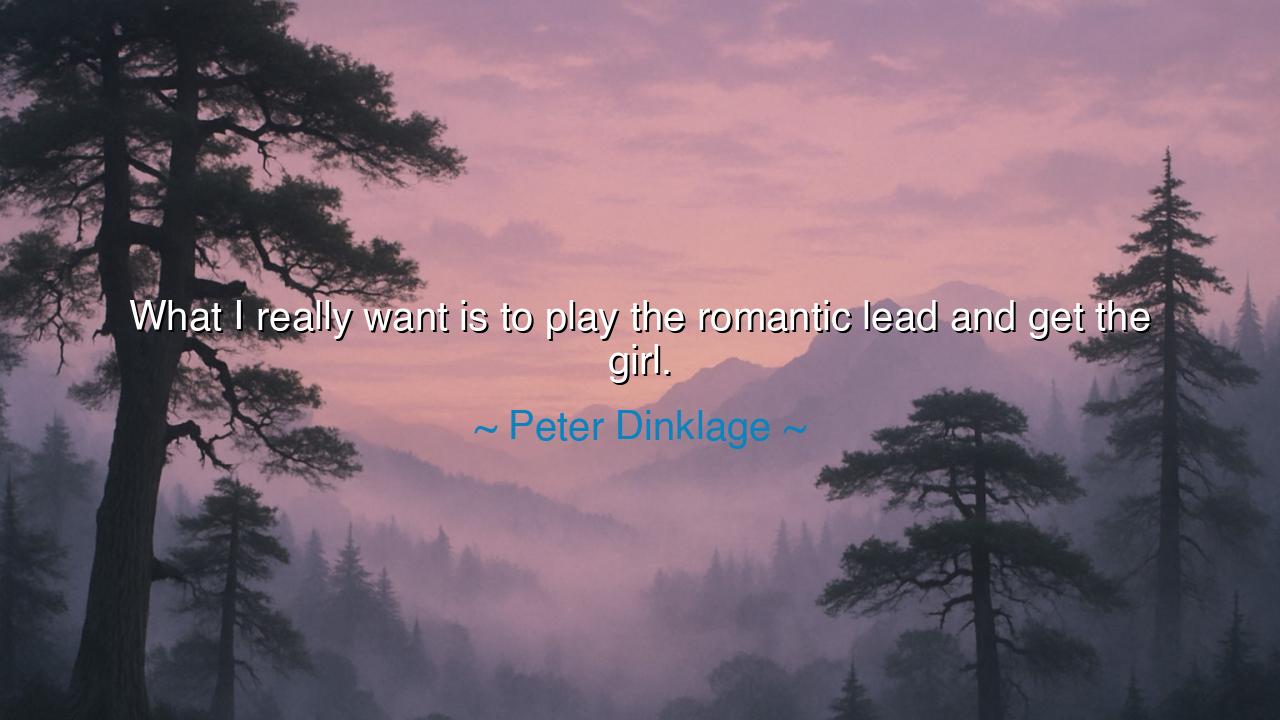
What I really want is to play the romantic lead and get the girl.






Listen, O children, to the words of Peter Dinklage, who speaks not just of his desires as an actor, but of a deeper yearning that resides in the hearts of all who long for love, recognition, and acceptance. He said, “What I really want is to play the romantic lead and get the girl.” In this simple yet profound statement, Dinklage expresses a universal longing—the desire to be seen, to play the hero, to be the one who is chosen, not just in film, but in life. This desire to be the romantic lead, to embody the figure of the hero, is not merely about the role we are given, but about the human need for connection and belonging.
From the beginning of time, the hero has always been central to the stories of mankind. The heroic journey is the path that many have walked, from Hercules to Achilles, from Odysseus to the many heroes of myth and legend. The hero is not simply the one who fights battles or defeats monsters; he is the one who seeks love, truth, and connection in a world filled with conflict and uncertainty. To be the romantic lead is to be the heart of the story, the one whose desires drive the plot, whose love becomes the very essence of the narrative. Dinklage’s words echo this timeless yearning, for he, like many before him, seeks not only the recognition of his craft but the affirmation of his humanity.
Consider, O children, the tale of King Arthur, the great king of Camelot, whose rise to power was not simply about conquest, but about his deep desire to create a kingdom founded on love, justice, and unity. Arthur was not merely a warrior; he was a man who sought to be the romantic lead of his own story, to be the one who could unite people through love and mutual respect. His greatest battle was not against external enemies, but against the forces within himself—the doubts, the insecurities, and the limitations that sought to define him. Like Dinklage’s desire to play the romantic lead, Arthur’s story is a journey of self-discovery, of stepping into the role of the hero, not just for the world but for his own heart.
In the world of cinema, the romantic lead is often portrayed as the one who is not only brave and strong, but also worthy of the love of others. But this desire for recognition and affection is not confined to the world of film. Every human being, whether they speak the language of theater or not, longs to be seen, to be valued, to be the one who is chosen by love and connection. Dinklage’s desire to play the romantic lead speaks to a deeper truth: that we all seek to be understood for who we truly are, not for the roles we are given or the limitations that others might place upon us.
This longing for romantic connection, for affirmation, is a thread that runs through the lives of great individuals throughout history. Napoleon Bonaparte, though a man of great military achievement, sought the love and recognition of those around him. His ambition was not just for power, but for the love of his people, the connection that comes with being seen as not just a ruler, but as a leader whose heart was in tune with the needs of the masses. Even in the world of politics, we see the same longing for the role of the romantic lead—not in the sense of romance as we understand it, but in the desire to be chosen, to be the one whose story becomes the narrative of the people.
And so, the lesson here, O children, is that the desire for recognition, love, and connection is universal. It is not something to be ashamed of, nor is it something that makes us weaker. To be the romantic lead in our own lives is not about perfection or the absence of flaws. It is about the courage to show our true selves, to step into the story of our lives with passion and vulnerability, and to be willing to seek love in its many forms. Whether in a romantic relationship, in friendships, or in the world around us, the desire to be chosen is not a weakness—it is the heart’s longing to be seen, to be understood, and to connect with something larger than ourselves.
Thus, O children, I say unto you: Do not be afraid to seek the role of the hero in your own life. Embrace the desire to be seen, to be loved, for it is through this yearning that we come to know ourselves. Just as Dinklage seeks to embody the romantic lead, so too must we all step into the roles we are destined to play in the story of our lives, with courage, honor, and conviction. Let your heart lead you, and in doing so, you will find that the romantic lead is not a title given to you by others, but one that you must claim for yourself, in the moments where your life becomes a story of love, connection, and truth.






AAdministratorAdministrator
Welcome, honored guests. Please leave a comment, we will respond soon